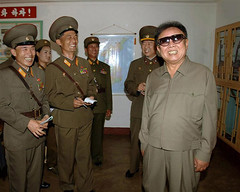On the face of it, there seems little reason why 23 million North Koreans should continue to support their "Dear Leader", says London newspaper The Telegraph. The country's economy has been devastated since the early 1990s and millions of people live on the edge of famine.
That has not deterred Kim from indulging his eccentric tastes. He allegedly imports £350,000 of cognac a year and eats lobster, caviar and sushi. He spent millions on a fleet of Mercedes Benz luxury cars and spends his time watching Hollywood movies such as Rambo or Friday the 13th.
No one inside North Korea would ever hear of this excess. Kim has banned mobile phones, newspapers, the internet and books. In 2004, he brought in a new criminal law, penalising anyone who tried to bring in outside music. Talking about his successor is banned too.
His ability to hold North Korea together, despite huge economic problems and public discontent, is a tribute both to his skill as a communicator and to his father's doctrine of Juche, or self-reliance.
The younger Kim wanted to be a movie director and famously kidnapped a South Korean film director and movie star to build the North Korean film industry. Even in 2006 he got involved in make a movie about a girl whose parents are scientists. This skill for storytelling and a certain visual flair has served him well.
Then there is Juche, the political doctrine that his father first introduced in the 1950s. According to Juche, North Koreans must be independent, economic self-sufficiency and self-reliance when it comes to defence. At the time time, the leader must be venerated.
The younger Kim, however, is more bellicose than his father, and regularly spends North Korea's budget on terrorism, rockets and nuclear development programmes when his people desperately need food. "That old economist's dilemma of guns or butter seems to have been played out quite literally in North Korea's case," said Aidan Foster-Carter, an expert on the region at Leeds University.
Subscribe to:
Post Comments (Atom)


No comments:
Post a Comment